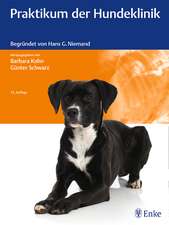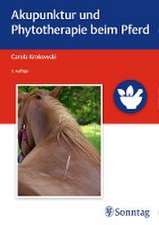Principles for Evaluation of One Health Surveillance: The EVA Book
Editat de Marisa Peyre, François Roger, Flavie Goutarden Limba Engleză Paperback – 4 apr 2023
Targeting not only scientists, including epidemiologists, but also technical advisers of decision-makers, the present work is suitable for the evaluation of any type of health surveillance system - animal, human or combined - regardless of the socio-economic context. The volume is richly equipped with practical tools and examples, which enables the reader to apply the methods described. Increasing importance of health surveillance, and threats from disease outbreaks such as the coronavirus pandemic, underline the practical relevance of this work, which will fill an important gap in the literature.
| Toate formatele și edițiile | Preț | Express |
|---|---|---|
| Paperback (1) | 781.55 lei 6-8 săpt. | |
| Springer International Publishing – 4 apr 2023 | 781.55 lei 6-8 săpt. | |
| Hardback (1) | 1109.44 lei 3-5 săpt. | |
| Springer International Publishing – 2 apr 2022 | 1109.44 lei 3-5 săpt. |
Preț: 781.55 lei
Preț vechi: 822.68 lei
-5% Nou
Puncte Express: 1172
Preț estimativ în valută:
149.62€ • 153.96$ • 126.12£
149.62€ • 153.96$ • 126.12£
Carte tipărită la comandă
Livrare economică 28 februarie-14 martie
Preluare comenzi: 021 569.72.76
Specificații
ISBN-13: 9783030827298
ISBN-10: 3030827291
Pagini: 320
Ilustrații: XXIII, 320 p. 77 illus., 72 illus. in color.
Dimensiuni: 155 x 235 mm
Greutate: 0.49 kg
Ediția:1st ed. 2022
Editura: Springer International Publishing
Colecția Springer
Locul publicării:Cham, Switzerland
ISBN-10: 3030827291
Pagini: 320
Ilustrații: XXIII, 320 p. 77 illus., 72 illus. in color.
Dimensiuni: 155 x 235 mm
Greutate: 0.49 kg
Ediția:1st ed. 2022
Editura: Springer International Publishing
Colecția Springer
Locul publicării:Cham, Switzerland
Cuprins
Why do we need to evaluate surveillance?.- The different types and level of evaluation.- Framework for Evaluating Animal Disease surveillance systems.- The Eva Survtool : an integrated framework for evaluation of health surveillance .- The economics of surveillance: ead author – Keith Howe – max 15 pages.- Economic evaluation methods From principles to practice:.- Quantitative Methods to Evaluate Health Surveillance Systems.- The use of participatory methods in evaluation of health surveillance systems.- Evaluation of collaboration in a multisectoral surveillance system: the ECoSur tool..- Quantitative methods to evaluate surveillance effectiveness.- Network analysis for animal health surveillance design and evaluation.- Animal health surveillance evaluation in the policy cycle.- Animal disease surveillance: compliance and real governance.- Integrating surveillance evaluation outputs in the policy cycle.- Added value and impact of the evaluation process.- Synthesis and further needs for innovation in health surveillance evaluation approaches.
Notă biografică
Marisa Peyre, Eng., PhD, is an epidemiologist at CIRAD, French Institute for International Agricultural Research for Development. She graduated in biotechnology engineering (Bordeaux, France) and obtained her PhD in Immunology (London, UK). Marisa has extensively worked on the evaluation of animal health surveillance and control both in developed and developing countries and provides expertise for international organizations (OIE, FAO). Her key expertise is on evaluation of animal disease management systems (surveillance and control), animal health economics and participatory epidemiology. She is the Deputy Head of the integrated health research unit (ASTRE) and coordinate for CIRAD the PREZODE initiative to prevent and early detect emerging zoonotic risks.
François Roger, DVM, Msc, PhD, is a veterinarian and epidemiologist at CIRAD. He has worked for more than 20 years in sub-Saharan Africa, Europe, Asia and the Indian Ocean as a researcher and Research Unit Director. He has developed and applied surveillance systems of animal and zoonotic diseases and interdisciplinary health networks in the field of emerging and endemic diseases by applying One Health concept. He is now the regional director of CIRAD for Southeast Asia.
Flavie Goutard, DVM, MSc, PhD, is a veterinarian and epidemiologist at CIRAD. She graduated from the National Veterinary School of Toulouse (France). Having a Master in Epidemiology and Public Health (London, UK) and a PhD in Health Risk (CNAM, France), she brings longstanding experience in the field of infectious diseases epidemiology in tropical countries. Flavie has mainly worked on the development of adapted surveillance, participatory approaches and control strategies for animal diseases in rural settings. She was an adjunct professor at Kasetsart University, Bangkok, Thailand, for 9 years where she directed a Master Program in the One Health field. She provides expertise for internationalorganizations (OIE, FAO), and is currently coordinating the regional research platform GREASE for Southeast Asia.
François Roger, DVM, Msc, PhD, is a veterinarian and epidemiologist at CIRAD. He has worked for more than 20 years in sub-Saharan Africa, Europe, Asia and the Indian Ocean as a researcher and Research Unit Director. He has developed and applied surveillance systems of animal and zoonotic diseases and interdisciplinary health networks in the field of emerging and endemic diseases by applying One Health concept. He is now the regional director of CIRAD for Southeast Asia.
Flavie Goutard, DVM, MSc, PhD, is a veterinarian and epidemiologist at CIRAD. She graduated from the National Veterinary School of Toulouse (France). Having a Master in Epidemiology and Public Health (London, UK) and a PhD in Health Risk (CNAM, France), she brings longstanding experience in the field of infectious diseases epidemiology in tropical countries. Flavie has mainly worked on the development of adapted surveillance, participatory approaches and control strategies for animal diseases in rural settings. She was an adjunct professor at Kasetsart University, Bangkok, Thailand, for 9 years where she directed a Master Program in the One Health field. She provides expertise for internationalorganizations (OIE, FAO), and is currently coordinating the regional research platform GREASE for Southeast Asia.
Textul de pe ultima copertă
This book outlines essential elements of the evaluation of health surveillance within the One Health concept. It provides an introduction to basic theoretical notions of evaluation and vividly discusses related challenges. Expert authors cover the entire spectrum of available, innovative methods, from those for system process evaluations to methods for the economic evaluation of the surveillance strategies. Each chapter provides a detailed description of the methodology required and the tools available as illustrated by practical examples of animal health or One Health surveillance evaluations in both developed and developing countries.
Targeting not only scientists, including epidemiologists, but also technical advisers of decision-makers, the present work is suitable for the evaluation of any type of health surveillance system - animal, human or combined - regardless of the socio-economic context. The volume is richly equipped with practical tools and examples, which enables the reader to apply the methods described. Increasing importance of health surveillance, and threats from disease outbreaks such as the coronavirus pandemic, underline the practical relevance of this work, which will fill an important gap in the literature.
Targeting not only scientists, including epidemiologists, but also technical advisers of decision-makers, the present work is suitable for the evaluation of any type of health surveillance system - animal, human or combined - regardless of the socio-economic context. The volume is richly equipped with practical tools and examples, which enables the reader to apply the methods described. Increasing importance of health surveillance, and threats from disease outbreaks such as the coronavirus pandemic, underline the practical relevance of this work, which will fill an important gap in the literature.
Caracteristici
Offers a step-by-step approach with detailed methodology, examples and practical tools Explains how to communicate evaluation results to decision-makers With a chapter on evaluation challenges and needs for innovation




